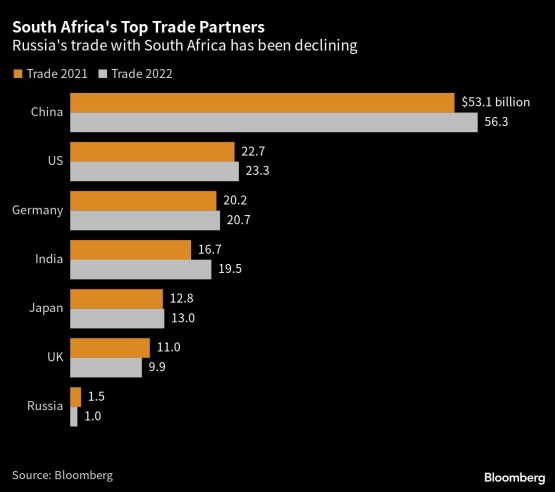The rand slumped to its weakest level on record against the dollar and government bond yields soared amid investor concern a diplomatic row between Pretoria and the US may put trade worth billions of dollars to South Africa at risk.
South Africa’s preferential access to US markets under a two-decade-old agreement is in focus after the US ambassador to Pretoria, Reuben Brigety, accused the country of supplying arms to Russia. The nation’s Presidency described the comments as “disappointing,” adding that no evidence had been produced to back up the claim, but that the countries had agreed on an independent investigation.
“The rand hitting a record low versus the dollar clearly highlights that investors have lost confidence in domestic policy makers in South Africa and are fearful that the US will impose sanctions,” said Lee Hardman, a currency strategist at MUFG Bank.
Some of the market reaction:
- The rand weakened as much as 1.6% to 19.5148 per dollar, breaching the all-time low of 19.3508 set during the Covid-19 lockdown in April 2020
- Yields on benchmark government bonds due 2032 rose 15 basis points to 11.75%, adding to Thursday’s 34-point jump
- The yield on dollar bonds due 2032 jumped 14 basis points to 7.80%, and is up 38 basis points this week
- The cost of insuring South Africa’s debt against default using credit-default swaps is up 34 basis points this week, and at the highest level since October
- The country’s sovereign risk premium — the extra yield investors demand to hold South Africa’s dollar yields rather than US Treasuries — has widened 42 basis points since Monday, while the emerging-market average has been flat
The US ambassador’s claim that armaments were collected by a Russian ship at the Simon’s Town naval base in Cape Town in December came with the rand already under pressure because of ongoing energy shortages that are undermining the economy. Investors are now asking questions about President Cyril Ramaphosa’s grip on his administration.
The rand has plunged 5% since Monday, heading for its biggest weekly decline in a year, while the cost of hedging in the options market against further weakness has soared the most since March 2020.
“It’s more than a currency crisis, it’s a re-rating of South Africa’s risk profile,” said Adriaan du Toit, the London-based director of emerging-market economic research at AllianceBernstein Ltd. “All asset classes are affected by this, and the powerful political dynamics mean that there is little hope of an effective policy response.”
Thousands of South African products enter the world’s biggest market duty-free under the African Growth and Opportunity Act, or AGOA, and the so-called Generalised System of Preferences, or GSP. South Africa shipped goods worth more than $15 billion to America in 2021, with $2.7 billion’s worth cleared under the two accords, US government data show. AGOA is due for review by Congress in 2025.
The US has not explicitly threatened to cut trade ties or impose sanctions, though Brigety said AGOA’s terms require that “no recipient of AGOA privileges should take actions that are directly in contrast to the national security interest of the United States of America,” according to a transcript of his comments seen by Bloomberg. “How the government’s position and in particular the uploading of ammunitions to a sanctioned Russian cargo vessel in Simon’s Town will be perceived in the context of that legislative requirement has yet to be determined,” he said.

Relations between South Africa and the US — its second-biggest trading partner after China — have soured over Pretoria’s insistence that it is taking a non-aligned stance toward Russia’s war in Ukraine. Even so, South Africa participated in naval exercises with Russia recently, while officials of the ruling African National Congress have expressed support for Russia’s invasion of Ukraine.
State Department spokesman Vedant Patel wouldn’t be drawn on whether the US would consider sanctions against South Africa should the arms claim prove true, but added during a regular State Department briefing Thursday that the US had “serious concerns” about a sanctioned Russian vessel docking in a South African port.
“The political stakes are high, with trade deals and market access all now in question,” economists at Rand Merchant Bank wrote in a client note. “This will add an additional layer of risk until the debate around this has cleared, and the rand should reflect that risk premium.”
© 2023 Bloomberg

